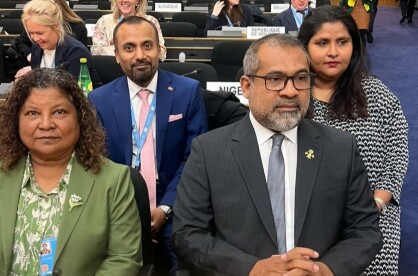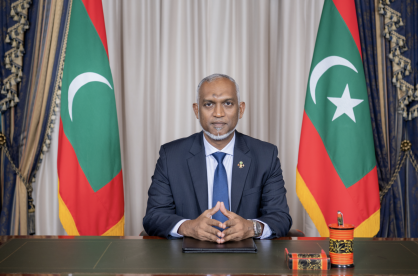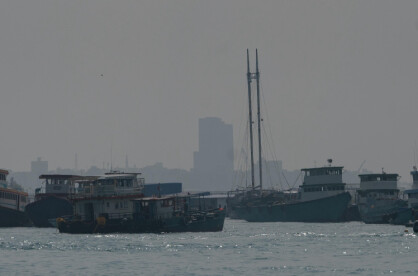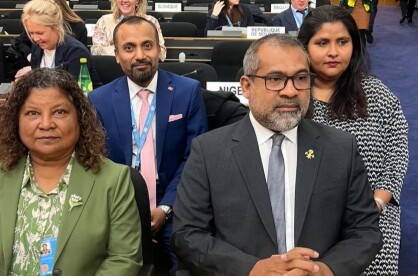The Corruption Perception Index Report
The Maldives is now ranked 85th in the Corruption Perception Index; three points down from last year.

Source - ACC Maldives via Twitter
The Maldives is now ranked 85th in the Corruption Perception Index; three points down from last year.

Source - ACC Maldives via Twitter
Corruption is a scourge upon humankind. From the developed nations of the Scandinavian region to the struggling colonial victim administrations of Asia and Africa, the seeds of corruption, and cutting corners, has been the one umbrella approach by the rich and privileged to trump the rights of citizens for their own benefit. The Maldives has been suffering this malady since time immemorial and recent statistics show that things are not getting better.
Transparency International is, according to their description, a global movement with the vision of a world in which governments, businesses, civil societies, and the daily lives of people are free of corruption. Their 100 chapters worldwide, including the local Maldives chapter, led by the secretariat in Berlin, has been at the forefront in the fight against corruption to make this vision a reality. To this end, they conduct research and compile statistics, give a listening year to whistleblowers and call out those who cross the line all in hope to bring to global attention these many instances of inequality.
Their 2021 report, the Corruption Perceptions Index, has shown that the global situation has not been improving. On top of that, they also disclose how Maldives not only failed to improve, but has been pushed down in their index.
Their index measures a 180 countries around the world from a score of 0 to a 100, with 0 being highly corrupt, and 100 being deemed as very clean. The nation that leads the pack is Denmark, followed by Finland, including new Zealand, at a score of 88, while trailing behind at the middle are North Macedonia, Suriname, Tanzania, Vietnam, Morocco, Guyana, Ethiopia, Colombia, and Kosovo at 39. The Maldives, sadly, sits around the 85th rank, just 1 point above, at 40. This puts the Maldives in the two thirds of nations below a score of 50. The countries at the lowest points are South Sudan, with 11 scored, lead by Syria, Somalia, and Venezuela at 13 and 14 points.
To no surprise, the pandemic has shown the corruption levels around the world had stagnated, going against the commitments made on paper, with 131 countries making no significant headway in combating this humanitarian crisis. Included in this are 27 countries that have hit historic lows in the year 2021.
The Maldives’ 2021 score was drawn from the composite assessment of three international sources: Global Insight Country Risk Ratings, Varieties of Democracy Project, and World Bank Country Policy and Institutional Assessment (CPIA). The data for Global Insight Country Risk Ratings and Varieties of Democracy Project were collected in the period January 2020 to January 2021 while the data for World Bank CPIA remained as data collected in the period January 2019 to January 2020.
In a nation led by an administration that has claimed the seat of power through a campaigned manifesto of ‘zero-tolerance’, the drop from 43 points in 2020 to 40 in 2021 shows an embarrassing failure to comply. The findings that the CPI has been based on show the usual story that has been a recurring theme in Maldivian administrations: weak investigation, prosecution, enforcement, and implementation of laws, lack of accountability of political and public officials, and the abuse of power by high-level individuals at the expense of the many.
Even cases of petty corruption seem to be lacking gusto within the courts, leaving the people wondering out loud at the wisdom of their voting choice back in 2018. The pervious administration had been notoriously singled out for dropping the scores down from 36 to 29 in three years, and when the Solih administration took over, the perceptions were obviously adjusted given the multitude of political promises — they managed to raise the score to 43, yet the almost instantaneous, drop in a year is a harbinger of more discontent amongst the people. Perhaps the slide of "only just three points" is more a testament to the current administration's international public relations prowess in managing perceptions positively as public sentiment of the administration's failure to properly address corruption and overreach is at an all time high. Negative sentiment speaks to appointments reeking of cronyism, the state's failure to properly investigate and prosecute heinous crimes and abuses of power, political overreach in a time of a public health emergency, posturing on the administrative form of governance — possibly for personal again rather than for genuine progressive reasons — and many other issues bubbling under the surface of public consciousness.
However, to be fair, the average score for the Asia Pacific region has been 44, and the Maldives being a part of this area is not doing as bad as some other nations in similar economic systems. Still, given the size of the population and the economies of scale, the ability to not only overtake this score but rise to globally acclaim is possible, as well as expected.
Transparency Maldives has once again laid out their recommendations. Their demands are not new, yet they have been as timely as ever.
To reduce corruption and restore trust in politics, Transparency Maldives echoes the call by Transparency International and recommends that the Maldivian government:
Furthermore, Transparency also, rightfully, point out that the vacuum created with the fiasco surrounding the Anti-Corruption Commission (ACC), with the resignation of all members, is alarming. While calling upon a parliament that is both questionable and reactionary to vote upon new members and reinstate the Commission is equally worrying, the current mechanisms in place needs an overhaul to create more just and fair action to combat corruption.
The findings of the ACC also need to be addressed with more detail, as scandals like that of MMPRC, the money laundered by the previous administration, and also the very questionable and invasive influence of neighbouring military powers with almost free-rein debt accretion only seems to undermine the ‘zero-tolerance’ champions of the Solih administration. The pandemic does bring with it an understandable excuse in certain areas of attention, but even with the ventilator case earlier last year, and the somewhat shady dealings of the hospitality industry, on top of the piñata-style distribution of state ministerial roles to anyone with or without political promise, means that the pubic may not be receiving that which they had honestly voted for in 2018.
With the re-election campaign already very openly on the way, there is much that needs to be taken with more than just a pinch of salt. Reshuffling the incumbent elites from one position to another (cue Ali Waheed and co.) is not the answer. If one court ruling can be upheld, it just might be the ember that sparks into a flame to raze the weeds of vile corruption, at least, within the next two more presidential terms.



